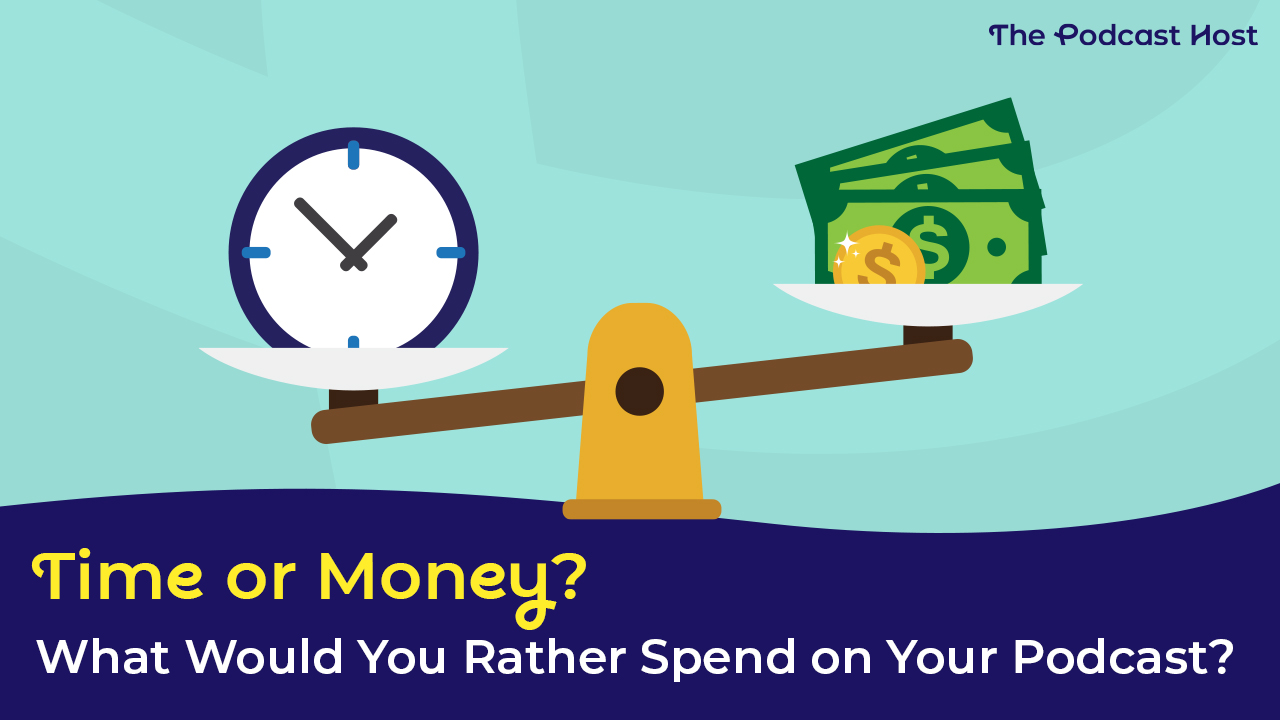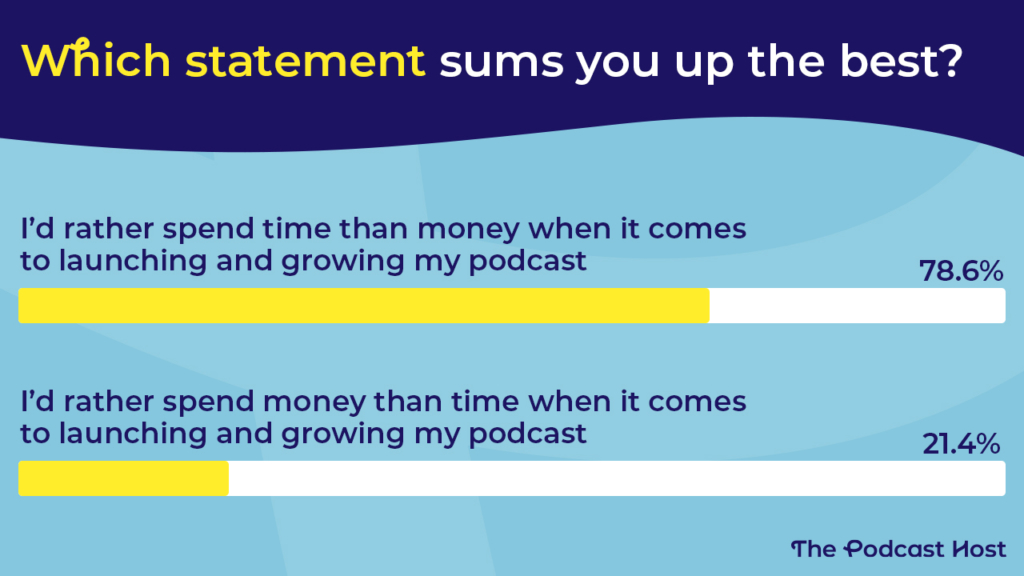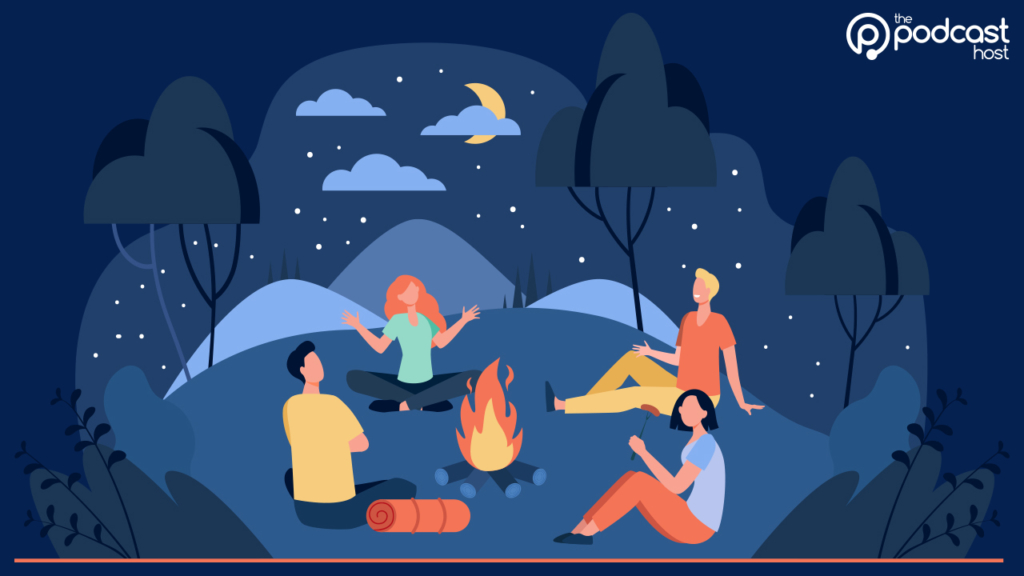Time or Money: What Would You Rather Spend on Your Podcast?

My grandmother used to say, “You either end up paying with your wallet or your back,” in reference to moving house. Either you could do all the heavy lifting yourself, or you could hire movers. Over time I’ve found this adage applies to a lot of things in life.
One of the questions we ask in our Podcast Planner Tool is around whether people would rather spend time or money on their shows. My grandmother’s aphorism echoed in my head as soon as I read it, and I got a little ache in my lumbar region. Time and money are both finite resources. Let’s look at both sides of this issue, and find a way to make the best choices for your podcast and your overall health.
As of this writing, we have 607 responses to our Podcast Planner Tool survey. It’s published on our site, here, and open to general visitors of our website, which includes a range of podcasters around the world.
What Did the Survey Say About Time or Money?
The survey doesn’t say anything, you have to read it. Whoops! Sorry, I get a little goofy after a whole day of this stuff.

Out of 607 respondents, a little over 78% of them said that they would rather spend time than money when it comes to launching and growing a podcast. 21.4% would rather spend money than time. So, roughly three out of every four would rather learn how to do different podcasting tasks themselves, and the remaining podcaster would prefer to subcontract that stuff out. Which approach is sustainable in the long term?
When Time > Money
Many respondents in our survey said that they would rather spend time and effort on their own podcast, rather than outsource. True, there’s a bit of bias here. The survey is on our site, where people go to learn how to fix their podcast problems, right? When you choose to spend time instead of money on your podcast, your benefits are:
- You gain expertise.
- You can use the skills you build on future projects, expanding your own horizons.
- Skills can’t disappear suddenly when they get their dream job elsewhere.
- Learning new skills and using them can be intrinsically rewarding.
- You have greater control over the end product (although “perfect” is the enemy of “done”).
- The podcast has your unique style, like a maker’s mark or an artist’s style.
These are all good things that make you a better podcaster in the long run. However, there are some drawbacks. if you don’t subcontract your work out to an expert, then:
- You need to update your skills, and stay informed. If you spend 10 hours learning to use Audition, and Adobe updates the software significantly, then you have to spend more time learning the updated material.
- Learning can cost money, too. Why not just spend the money you’d spend on a class to have someone else do the work?
- The extra work of learning can cause podfade.
- Doing it all yourself can be isolating.
- Spending extra time to learn skills and practice them slows down your workflow. But, once you know what you’re doing, you can increase your episode publication frequency.
When Money > Time
There are many good reasons to hire someone else to do podcast tasks that you don’t enjoy, or use an automated tool (like Meet Edgar, PodPage or Alitu) to pick up the slack.
- Most likely the person you hire can do the job faster and better than you can.
- Reliable expertise leads to a reliable product
- Get launched and promoted faster, more consistently
- You can spend more time on your podcast content
- It’s more likely that you can sustain the podcast for the long haul.
But, there are some reasons not to hand off tasks to someone else.
- The amount you have to spend could be more than your podcast makes. In fact, especially when you first start, it probably is.
- By taking your hands off of the work, you have less of an emotional investment in the podcast.
- You run a risk when you put your work into someone else’s hands.
- The person you hire can always quit, and then you’re back where you started
- If your relationship with them isn’t fair and equitable, they can affect your reputation.
- You have to accept that you can’t tweak it once the contractor has finished their part of the job
- The final product has less of you and your uniqueness in it.
How can you get the benefits of the do-it-yourself approach, and the ease of hiring a subcontractor?

Balance Time and Money: Learn While You Outsource
Some people choose to spend time instead of money because their budget is minimalist. Others podcast as a marketing angle for their business and have to stay focused there. Otherwise, there’s no point in having a podcast. Time and money aren’t an either/or proposition. When you take a close look at your actual resources, you find that you can spend a bit of both. Then, you get more back in return. For example:
- Swap skills with another podcaster, then watch and learn from them as they work.
- Use a tool like Alitu, *and* learn how to edit audio ( for example, Linked In Learning has a Logic Pro course that seems to take about 10 hours).
- Use a tool like Canva to make your Season 1 cover art, then use an open-source graphic design tool like GIMP (there are tutorials aplenty on YouTube) for Season 2.
- Cross-promote your show with other podcasters, so you spend less money and time while building new networks and audiences.
Don’t think of what you put into your podcast as a time or money proposition. A multi-faceted approach to launch and promotion gives you more options in your podcasting tool belt. You can get launched with help while building skills for the future. This way, so you aren’t stuck if your freelancer is unavailable.
You Get What You Give
Despite my grandmother’s adage, she wasn’t a time or money person. She would cook expansive meals, babysit, drive people to appointments, fold laundry, clean, and perform a lot of in-kind labour to help others. She was also no stranger to writing checks. In the end, she had a very sore back, a happy life, and a lot of friends.
Learn to accept that your podcast might not be NPR or BBC-perfect at launch. Perfectionism can keep you from getting work finished and published. Once you’ve done that, learn podcasting skills for the long term. Working with others can help you build your skills. Learning new things makes you happier, too. This way, when you’re ready to improve or change your podcast, you’ll have your skills ready for action.
